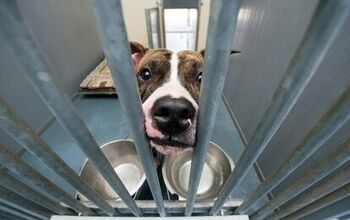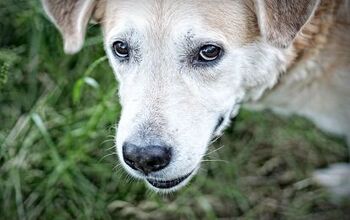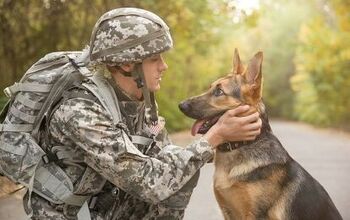Birds do it, bees do it… even dog breeds do it! Experts say the “talk” with your dogs should include canine sexually transmitted diseases.
While we may poke a little fun at doggy Sexually Transmitted Diseases (STDs), they are truly no laughing matter. Many pet owners are not even aware that dogs are able to get, carry and share canine venereal diseases. It’s important to know all about them, especially when it comes to mothers who whelp puppies.
There are three common sexually transmitted diseases that most affect dogs–Brucellosis, Canine Herpesvirus and Canine Transmissible Venereal Tumors. Though the three are rare in a typical companion animal who has been spayed or neutered, these diseases can run wild in populations of stray or feral dogs. Dog breeders are also cautioned to screen their dogs for these diseases annually, just in case.
Related: Study: A Dog’s Diet is Important To His Gut in More Ways Than One
Brucellosis is the most common canine STD in the animal kingdom, though the least common in dogs, and is caused by bacteria. The bacterial infection is caused by Brucella canis, and strays with little to no access to consistent vet care are most at-risk. Because the risk population is largely homeless pets who are not spayed or neutered, your average domestic pet is unlikely to be affected.
That said, Brucellosis is spread through sex between dogs, and dogs can also become hosts for the bacteria when they come in contact with or ingest urine of an affected dog. Should your dog accidentally have a little romp with the local stray stud of the neighborhood, she may be at risk. An infected mother will most likely give birth to stillborn puppies because of the bacteria, and contact with that placental tissue may also infect other dogs.
Brucellosis is manageable, though there is no complete cure, and check with your vet should anything unexpected occur. Brucellosis is another reason why spaying or neutering is so important.
Interestingly, Brucellosis is the only canine STD that can be spread from dogs to humans. The Center For Disease Control says that this typically happens when humans are exposed to unpasteurized dairy. There are rare instances when humans will have contact with a pregnant carrier and infected body fluids from birth, but if wearing proper protective gear when assisting with birth, they should not be compromised.
Canine Herpesvirus sounds just like you might think–the canine version of ‘herpes’. Also called CHV, it is the most widespread of dog STDs. There are estimates that up to 70% of dogs may actually carry the virus, though most who have it do so in latent or dormant form. As with Brucellosis, the greatest at-risk population is stray/wild or feral dogs, but in breeding situations with sexually active dogs, even in responsible breeding, there is some risk. Typically, CHV can produce ‘fading puppy syndrome,’ which is sadly recognized in puppies who contract the virus in the womb or shortly after they are born. In those situations, the virus is fatal and puppies do not live much longer than four weeks.
CHV is hard to detect because there are almost no visible symptoms (aside from sores, like in human cases), but newborns who are weak, lack appetites and have discolored faces may be showing signs, though often they pass before any action can be taken. The virus rests in the reproductive and respiratory systems of its host, so air transmission or bodily fluid passing (which means licking, sniffing and sexual transmission are not necessarily safe) are the most common ways it is passed on.
Again, spaying/neutering can help prevent getting the virus for those not already infected, and breeders should be concerned about making sure their dogs are virus free in any and all breeding situations. There is no vaccine or cure for CHV, but it is only spread from dog to dog, and humans will not catch it from their pet.
Canine Transmissible Venereal tumors (CTVT) are infectious tumors of cancer. They begin as pink/reddish growths (which are contagious) and are spread from dog to dog by licking or having direct contact with body fluids (either from the sore or through intercourse if the tumors are still internal as well).
As the cancer matures, the dog will start to show signs of growth outside, particularly if the cancer is undiagnosed and untreated. The tumors grow on the genitalia of males and females and can also spread on the dogs’ face before they begin to appear in other places.
Again, strays who have not been spayed or neutered are at the greatest risk for this cancer and unfortunately, when the disfiguring growths are finally recognized, the cancer has been growing for months and the prognosis for the dog is grim. CTVT is the most common of sexually transmitted diseases and though it has a high mortality rate in strays, in domestic pets, if caught early, the prognosis for full recovery is excellent.
Related: FDA Warns Pet Parents About Skin Cancer Cream
Though chlamydia is a common human STD, the variety of bacterial chlamydia that dogs are susceptible to is not one they can contract through sex or even the bodily fluids of other dogs. Dog chlamydia differs from the typical human chlamydia you may be aware of because it is caused by a bacterium dogs catch when they rub their noses through dry bird poop. Humans can also contract this type of chlamydia, from birds only, but again, it is different than the type of sexually transmitted chlamydia humans more commonly get.
Sadly, the dogs at greatest risk for these conditions are the least cared for dogs–strays and feral/wild dogs. As more spay/neuter programs continue to work on decreasing the numbers of stray dogs everywhere, and in effect, hopefully that population will become less vulnerable. In the meantime, you can take actions by strongly considering spay and/or neuter procedures for your family pets as well.






















